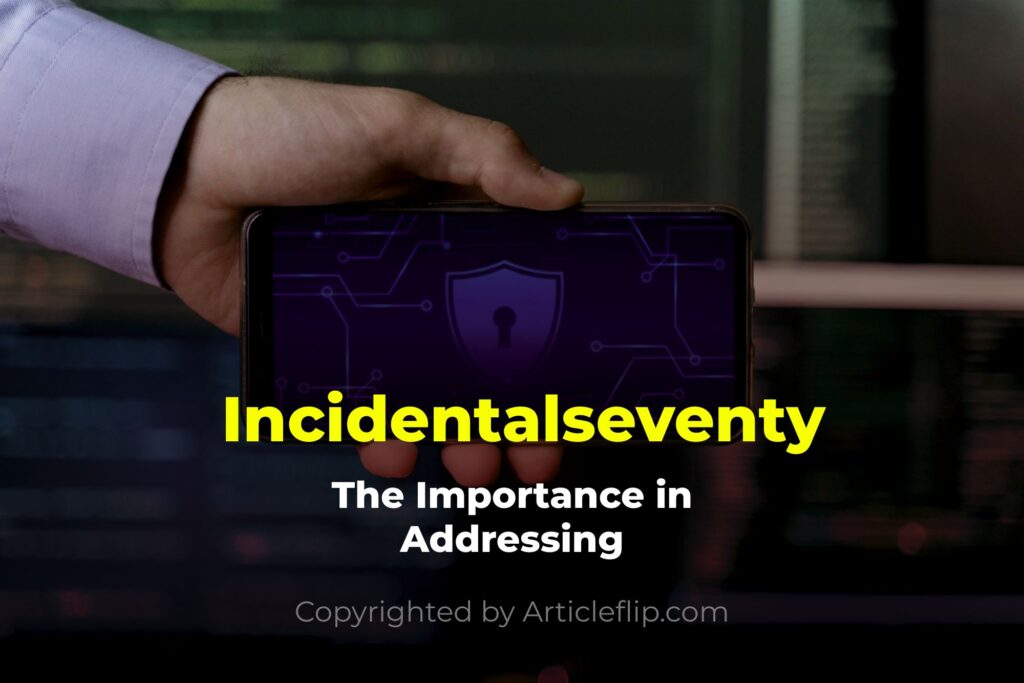Understanding incidentalseventy
In the realm of digital security and risk management, the term incidentalseventy refers to unforeseen events or occurrences that have the potential to disrupt normal operations, compromise data integrity, or pose a threat to an organization’s overall well-being. These incidents often arise unexpectedly and can have severe consequences if not addressed promptly and effectively.

Table of Contents
The Impact of incidentalseventy
incidentalseventy can manifest in various forms, ranging from accidental data breaches to system failures and cyberattacks. For instance, a simple misconfiguration in a cloud server could lead to sensitive information being exposed inadvertently, resulting in reputational damage and financial loss for the affected organization.
The Importance of Addressing incidentalseventy
Ignoring incidentalseventy can have significant repercussions, including legal liabilities, financial penalties, and damage to brand reputation. Organizations must recognize the importance of proactive measures to mitigate the risks associated with incidentalseventy.
Common Causes of incidentalseventy
Human error, lack of oversight, and technological failures are among the primary causes of incidentalseventy. Mistakes made by employees, inadequate security protocols, and outdated software can all contribute to the occurrence of such incidents.
Detecting and Preventing incidentalseventy
Implementing robust monitoring systems and conducting regular security audits are essential for detecting and preventing incidental events. By identifying vulnerabilities early on and implementing appropriate safeguards, organizations can minimize the likelihood of incidents occurring.
Mitigating the Effects of incidentalseventy
In the event of an incident, swift and effective action is crucial to minimize its impact. Developing comprehensive incident response plans and establishing clear communication channels can help mitigate the effects of incidental seventy and facilitate a timely recovery process.
Case Studies
Several high-profile incidents serve as stark reminders of the importance of addressing incidental events. From data breaches at major corporations to widespread cyberattacks on critical infrastructure, these case studies underscore the need for proactive risk management strategies.
The Role of Incident Management
Effective incident management is essential for addressing incidental events in a systematic and coordinated manner. This involves establishing clear roles and responsibilities, implementing incident response procedures, and leveraging technology to streamline the process.
Training and Education
Educating employees and stakeholders about the risks associated with incidental seventy is crucial for fostering a culture of security awareness. Ongoing training programs and workshops can help ensure that individuals are equipped with the knowledge and skills needed to prevent and respond to incidents effectively.
Legal and Ethical Considerations
Compliance with relevant laws and regulations is imperative for managing incidents effectively. Moreover, organizations must consider the ethical implications of their actions and strive to uphold the highest standards of data privacy and security.
Future Trends and Predictions
As technology continues to evolve, so too will the nature of incidental events. Emerging trends such as artificial intelligence and the Internet of Things present both opportunities and challenges for incident management professionals, who must adapt their strategies accordingly.
Conclusion
In conclusion, incidental events pose a significant threat to organizations of all sizes and industries. By understanding the causes, impacts, and best practices for prevention and response, organizations can mitigate the risks associated with incidental events and safeguard their assets and reputations.
FAQs
What are some examples of incidental seventy?
Examples include accidental data breaches, system failures, and cyberattacks resulting from human error or technological failures.
How can organizations detect incidental seventy?
Organizations can detect incidents through robust monitoring systems, regular security audits, and the use of advanced detection technologies.
What steps should organizations take to prevent incidental seventy?
Organizations should implement proactive measures such as employee training, security awareness programs, and the use of updated software and security protocols.
What are the legal and ethical considerations associated with incidental events?
Organizations must comply with relevant laws and regulations governing data privacy and security, and they must also consider the ethical implications of their actions in managing incidental events.
What does the future hold for incidental seventy prevention and response?
With the continued evolution of technology, incidental events prevention and response strategies will need to adapt to address emerging threats and challenges effectively.
If you found our content helpful don’t forget to share it on your social media: Twitter
More Articles
